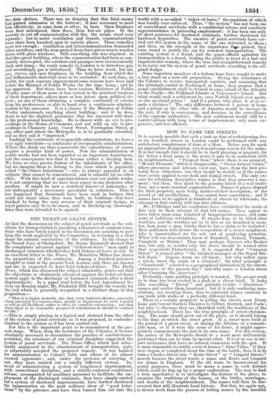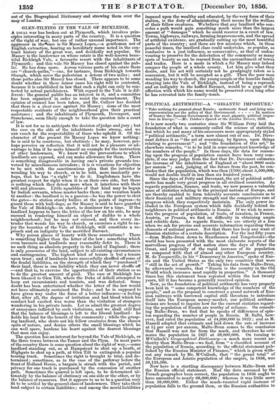HOW TO NAME THE STREETS.
IT is scarcely possible that such a task as that of rechristening five or six hundred streets in London could be performed with any satisfactory completeness if done at a blow. Before you fix upon an appropriate designation, you demand some reason for the name. It is not enough that it should be in itself pleasing or piquant, for the better a local name is the worse it may be in connexion with its neighbourhood. "Prospect Row," where there is no prospect, "Mount Pleasant," which is disagreeable, "Green Arbour Court," where greenness and arbours exist not, have from the first pro- bably been ridiculous, but they would be doubly so if the names were newly applied to our dark and dismal streets. The only ex- cuse for retaining descriptive names is that they preserve a me- mory; but then, they must be the genuine labels of a real tradi- tion, not a mere nominal augmentative. Names of places depend for their propriety upon being matter-of-fact description, or the record of old recollections. You cannot force association ; and if names have to be applied to hundreds of streets by wholesale, the attempt to find variety will run into silliness. Mr. D'Iffiufger and his coadjutors have established the truth of this rule in their attempt to find 554 names. They appear to have fallen upon some hundred of inappropriatenesses, and some score of ludicrous trivialities. If streets were to be titled after worthies, and the worthies are to be five or six hundred in num- ber, how many a man thinks that he has a claim to be included ! Mere politeness will dictate the recognition of a clever neighbour, who is immortalized for the sole end of perplexing posterity. What will our descendants know of Ransford, Acland, Patmore, Campbell, or Miskin ? They may perhaps discover who Booker was, but only to wonder why the street should be named after that respectable Protectionist. It is suggested that "Cameron Street" is named after "the talented manager of the Royal Bri- tish Bank." Eugene Aram we all know ; but why inflict upon a whole street the name of a criminal ? On what principle is " Clanricarde " selected as a geographical distinction by the street- christeners of the present day? and why name a London street after Channing the American?
Evidently, some guiding principle is wanted. The proper work to be done has been evaded in a dash at a clever trick. It looks like something " liberal " and patriotic to take " illustrious " names and scatter them broadcast; but it is only confusing asso- ciations, not creating them, thus to confound names eminent in- one walk with walks of a perfectly different kind. There is a certain propriety in giving the streets near Drury Lane and Covent Garden Theatres to Cibber, Garrick, and Foote ; but why P—Because they are identified with the traditions of the neighbourhood. There lies the true principle of street-christen- ing. The name should grow out of the place, or it should belong to the time at which the street grew. If a street were built at the period of a great event, or during the lifetime of a remark- able man, or if it were the scene of his home, it might appro- priately commemorate the fact in its own name. For this reason,, the names of the Metropolis should be a work more deliberately performed than can be done by special edict: It is of no use to im- port nicknames that have no natural connexion with the spot. It, is more reasonable to entitle a row of houses "Alma Villas," if they were begun or completed about the time of the battle, than it is tor turn a Charles Street into "Keats Street" or " Lingard Street," merely because the street wants a- name and Keats and Lingua. are names in England. If the old name be inconvenient for, postal purposes, there must be many a name in each district. which could be dug up by a proper exploration. The way to find - a true appellative is to investigate the history of the place, to examine the traditions of the houses, or the births, marriages, r and deaths of the neighbourhood, The names will then be • - covered that will illustrate local history. But this, we again say, is slower work than the process of taking names by the handful.
out of the Biographical Dictionary and strewing them over the map of London.

































 Previous page
Previous page